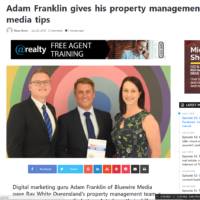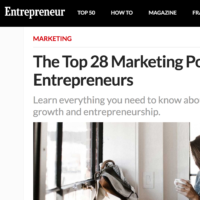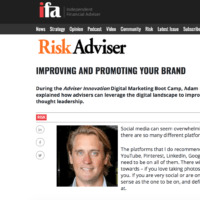
Property managers hone social media skills
DIGITAL marketing guru Adam Franklin of Bluewire Media last week gave Ray White Queensland’s property management members a masterclass in social media to keep their skills sharp in a fast moving environment.
Ray White

Social media no substitute for ‘important’ hard work, says expert
One social media expert says that in the fast-paced, competitive world of real estate, implementing a social media strategy shouldn’t be confused with taking a shortcut.
Bluewire Media’s digital marketing expert, Adam Franklin, said that social media isn’t an excuse to avoid the “important work” of making sales calls and closing new business.
Real Estate Business

Adam Franklin gives his property management social media tips
Digital marketing guru Adam Franklin of Bluewire Media gave Ray White Queensland’s property management team a masterclass in social media last week to keep their skills sharp in a fast-moving environment.
Elite Agent

The social media mistake that killed a business
While some social media faux pas can generate controversy or bad reviews, a digital marketer has pointed out that certain mistakes can even lead to the worst possible outcome: business collapse.
My Business asked Adam Franklin — a digital marketing speaker and marketing manager at Bluewire Media — some of the common questions business leaders have about the best and worst things to do with social media, with some eye-opening responses:
Should businesses abandon their own profiles and go for individual profiles?
“Yes, absolutely. That is totally what I would recommend people do, and I think we’ll see more and more of it. Because at the end of the day, we do business with people moreso than we do with companies … trust sits with the individuals,” said Mr Franklin.
“If somebody jumps ship and leaves the company, they will typically take their clients with them, because the trust does typically sit with the individual.”
He stressed that while many business leaders are fearful of having employees develop their own social channels and personal profiles, ultimately this is where the bulk of business leads and clients will come from, and as such should be fostered, not hampered.
Should we have separate profiles for business and personal use?
“It’s not the right approach,” Mr Franklin suggested.
First and foremost, doing so can be against the conditions of use, as is the case with LinkedIn, which could lead all of your accounts to be blocked – perhaps indefinitely.
But Mr Franklin suggested that even if you could get it past the platforms, doing so is still not the best idea.
“As a person, you’re a business owner, you’re a friend, you’ve got your network and a lot of it overlaps. I think if you’re creating different profiles — one for professional and one for friends or whatever — not only are you doubling the amount of work for yourself in terms of keeping those profiles up-to-date and putting content out and connecting with people, it’s not really an accurate reflection of real life,” he said.
“If you go to a social party, people will say ‘how’s work?’ and you’ll start talking about work stuff; and when you turn up at work, people will ask about your social life. So in real life, there is no barrier between work and private life, particularly for business owners.
“We do business with people we know, like and trust, and if you actually get a glimpse or an insight into this person’s real life outside of work, we can see that they’ve got certain hobbies or certain friends and things that they get up to. So it helps you amplify trust.”
How can employers manage what staff say and do on social media?
Mr Franklin acknowledged that many business leaders are hesitant, or downright against, allowing their workforce unfettered access to their social media accounts. But controlling, moderating or restricting access is both time-consuming and risky in its own right given the blurred lines between professional and personal social media usage.
Yet as his previous comments on trust demonstrate, restricting access altogether can also be an unwise move.
Instead, he suggested formalising a workable strategy that allows employees to know what they can and cannot do on social media.
“Employees need to realise that everything they say and do on social media has just as many repercussions as in real life: if you say the wrong thing, leak confidential or whatever else, you’re totally liable,” he said.
“It is important that companies have, for both the employees and the company, social media guidelines or social media policies so that everyone is aware what they can and can’t do.”
The degree of flexibility, Mr Franklin said, can ultimately be up to the business owner — such as rules about what constitutes inappropriate language, attribution of comments on behalf of the firm or the individual and so on.
However, such a policy should be part of the employment contract and form the cornerstone of training on proper procedure, rather than simply putting it under an employee’s nose to sign and then locking it away in a drawer.
What are the biggest business mistakes on social media?
For Mr Franklin, there are two core mistakes that can prove devastating to any business, and they mark taking things to the extreme.
“To be honest, I think the biggest faux pas is neglecting it — still — and [business leaders] burying their head in the sand,” he said.
“They are neglecting this huge opportunity because they are scared of a couple of things that could go wrong, and in doing so they are blinding themselves to the huge opportunity.”
However while erring on the side can lose potential customers and sales, taking things to the opposite extreme and relying to heavily on social media can actually place your entire business in jeopardy.
Citing the example of Little Things, Mr Franklin said an over-reliance on social media platforms can have an even more devastating impact on your business.
“It was an online publication that amassed 12 million followers, but it was entirely dependent on Facebook,” he explained.
“When Facebook changed the algorithm, they couldn’t communicate with their customers, and they went out of business. So it can happy very easily if you’re totally reliant [on social media].
“The moral of the story is to try and use these social media platforms to initiate a relationship with a prospect, but then get them onto your own platform that you own, which is really your email list and your website. That way, you own the relationship with your prospects and customers.”
My Business

If You Aren’t Doing Content Marketing, You’re Missing The Boat
The Content Marketing Institute together with Marketing Profs and Curatar eleased an essential study recently. You need to read it.
Why? Because it found that 75% of companies are increasing their investment in content marketing/
Forbes

Top 28 Marketing Podcasts for Entrepreneurs
#9. Web Marketing That Works Podcast
Hosted by real-life marketing experts Adam Franklin and Toby Jenkins who authored a book of the same name, their guests discuss their failures and reveal the truth about what really works on the web.
Entrepreneur





